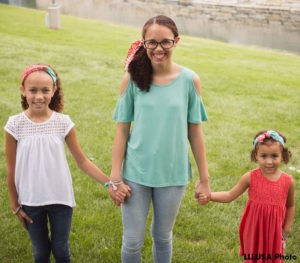 AJ Cecil-Starlin, Omaha, Nebraska.
AJ Cecil-Starlin, Omaha, Nebraska.
I breastfed my three children for a total of four years. One of the things that had the biggest impact on my breastfeeding journeys was advice. Good advice and bad advice. Breastfeeding, for whatever reason, was not something that was easy for me — at least not for the first few months. The difference wasn’t the challenges I faced so much as the advice I received in handling those challenges.
When I was pregnant with my oldest daughter I knew nothing about breastfeeding. I didn’t really know anyone who had breastfed, and I hadn’t ever really seen anyone do it. I didn’t even consider breastfeeding until later in my pregnancy after reading a short chapter on it in a pregnancy book. I had never heard of lactation consultants or La Leche League. My childbirth preparation class covered very little, and the breastfeeding class I attended was geared more towards returning to work, not the basics of breastfeeding.
During my pregnancy, breastfeeding was not something that my obstetrician and I discussed. I don’t even recall her asking if I planned to breastfeed. My daughter was born on a Friday, just before 5 p.m., and we went home Sunday morning. There were no lactation consultants at the hospital on the weekend, so we didn’t see anyone. I had pain and the start of nipple damage but was assured by one of the nurses that it would get better once my nipples “toughened up” and that I just had to power through the pain. By the end of that third night I was at my wits end. My nipples were raw and bleeding, and it was so painful latching on my daughter. I called my mother in tears, ready to give up. She suggested I give my daughter a pacifier, and that I not let her nurse so often as nursing too often was probably what was causing the pain and damage. No more than every three hours was plenty. She assured me a pacifier wouldn’t hurt anything. I followed the advice of the nurse and my mother. Eventually the pain decreased and my nipples healed. I made sure to keep an eye on the clock and not nurse “too often.”
When my daughter was 12 weeks old I returned to work. My husband or my mother-in-law watched her while I was working. There was never enough time or private space available for me to pump. A few times I tried using the manager’s office, but the breakroom was on the other side of a large window and there were almost always people taking a smoke break if the restaurant wasn’t busy.
I would pump in between nursing sessions or after my daughter was in bed for the night. It never seemed like enough. If I worked for four hours, my mother-in-law would end up feeding eight to 10 ounces of milk and tell me that it hadn’t been enough. I reached out to my obstetrician, worried about my milk supply. Her only advice was to take a medication to increase my supply. It didn’t really make a difference, so I reached out to my daughter’s pediatrician and her advice was to supplement with formula. Within a month of supplementing, we were exclusively using formula. That was the end of our breastfeeding journey. I was devastated.
Fast forward a decade and I was expecting my third child. I wanted to successfully breastfeed for a year this time. My second breastfeeding experience had been as difficult as my first and I really wanted the third time to be different. During my pregnancy I found a new pediatrician who was also a highly recommended IBCLC (International Board Certified Lactation Consultant). I started attending La Leche League meetings during my last trimester. I had a midwife who was very supportive of breastfeeding as well. I felt like I finally had a team of knowledgeable support and enough personal knowledge to be successful this time.
My third daughter was born on a Thursday, and we spent just over 24 hours at the hospital before heading home. We saw my pediatrician and the hospital IBCLCs during our short stay. She latched on fairly well, but I still had some pain that first evening after she was born. My pediatrician noticed that my daughter had a tongue-tie, but we decided to wait and see how things progressed over the next few days. The IBCLC helped me work a bit on better positioning. Then we headed home.
Late that third night I started having a very hard time getting her to latch. By Sunday morning she was refusing to latch at all. I didn’t have a breast pump yet, so a kind acquaintance brought me a manual one to try that afternoon. She encouraged me to try to pump or hand express frequently, and I did though I was only getting very small amounts of milk. By the evening, my daughter was still not latching. Exhausted and concerned about dehydration, I sent my husband to get a can of formula. My pediatrician was out of town, but we had a follow-up appointment scheduled for the next day. I was worried this was the end before we even really had a chance to begin.
 Thankfully, our appointment with the pediatrician was early in the day. The pediatrician spent over an hour reassuring me, demonstrating and helping me hand express, showing me how to give my milk to my daughter with a cup instead of a bottle and working on getting her to latch. The pediatrician revised the tongue-tie, and we were able to get my daughter latched on my left breast successfully! She still refused the right breast, but we had made huge progress. The pediatrician advised me to keep working on getting my daughter to latch, stop any bottles/pacifiers, stop supplementing, and not get discouraged. I was able to get her to latch at both breasts with no problems with the help of nipple shields.
Thankfully, our appointment with the pediatrician was early in the day. The pediatrician spent over an hour reassuring me, demonstrating and helping me hand express, showing me how to give my milk to my daughter with a cup instead of a bottle and working on getting her to latch. The pediatrician revised the tongue-tie, and we were able to get my daughter latched on my left breast successfully! She still refused the right breast, but we had made huge progress. The pediatrician advised me to keep working on getting my daughter to latch, stop any bottles/pacifiers, stop supplementing, and not get discouraged. I was able to get her to latch at both breasts with no problems with the help of nipple shields.
When my daughter was eight days old, I developed mastitis in my right breast, along with a large abscess. During the eight weeks I battled mastitis, my midwife and pediatrician never advised me to stop breastfeeding on the afflicted breast. They made sure I saw specialists who were supportive of breastfeeding and advised me to continue breastfeeding. They helped advocate for a less invasive procedure to drain my abscess that was significantly less likely to damage any milk ducts or interfere with breastfeeding. I was even encouraged to continue breastfeeding during the five days I had a surgical drain in place on my breast.
The support and good, evidence-based advice made all the difference. I went on to reach not only my goal of breastfeeding for a year but to breastfeed until my daughter was ready to wean at the age of three years and three months old.
 Advice plays an important role in the breastfeeding relationship.
Advice plays an important role in the breastfeeding relationship.
We want to ensure that every breastfeeding parent receives good information and advice.
Please consider donating $5 to end bad advice. Stop the #BadBFAdvice.
Donations of any amount are gratefully accepted, and for a minimum gift of $25 your special message of congratulations, encouragement, or appreciation can be published in New Beginnings Blog.
Thank you!
SaveSave
Please send your story ideas to Amy at [email protected].
Leave a Comment
Last Updated: June 5, 2018 by Yael Breimer
Stop the #BadBFAdvice: AJ’s Experiences
I breastfed my three children for a total of four years. One of the things that had the biggest impact on my breastfeeding journeys was advice. Good advice and bad advice. Breastfeeding, for whatever reason, was not something that was easy for me — at least not for the first few months. The difference wasn’t the challenges I faced so much as the advice I received in handling those challenges.
When I was pregnant with my oldest daughter I knew nothing about breastfeeding. I didn’t really know anyone who had breastfed, and I hadn’t ever really seen anyone do it. I didn’t even consider breastfeeding until later in my pregnancy after reading a short chapter on it in a pregnancy book. I had never heard of lactation consultants or La Leche League. My childbirth preparation class covered very little, and the breastfeeding class I attended was geared more towards returning to work, not the basics of breastfeeding.
During my pregnancy, breastfeeding was not something that my obstetrician and I discussed. I don’t even recall her asking if I planned to breastfeed. My daughter was born on a Friday, just before 5 p.m., and we went home Sunday morning. There were no lactation consultants at the hospital on the weekend, so we didn’t see anyone. I had pain and the start of nipple damage but was assured by one of the nurses that it would get better once my nipples “toughened up” and that I just had to power through the pain. By the end of that third night I was at my wits end. My nipples were raw and bleeding, and it was so painful latching on my daughter. I called my mother in tears, ready to give up. She suggested I give my daughter a pacifier, and that I not let her nurse so often as nursing too often was probably what was causing the pain and damage. No more than every three hours was plenty. She assured me a pacifier wouldn’t hurt anything. I followed the advice of the nurse and my mother. Eventually the pain decreased and my nipples healed. I made sure to keep an eye on the clock and not nurse “too often.”
When my daughter was 12 weeks old I returned to work. My husband or my mother-in-law watched her while I was working. There was never enough time or private space available for me to pump. A few times I tried using the manager’s office, but the breakroom was on the other side of a large window and there were almost always people taking a smoke break if the restaurant wasn’t busy.
I would pump in between nursing sessions or after my daughter was in bed for the night. It never seemed like enough. If I worked for four hours, my mother-in-law would end up feeding eight to 10 ounces of milk and tell me that it hadn’t been enough. I reached out to my obstetrician, worried about my milk supply. Her only advice was to take a medication to increase my supply. It didn’t really make a difference, so I reached out to my daughter’s pediatrician and her advice was to supplement with formula. Within a month of supplementing, we were exclusively using formula. That was the end of our breastfeeding journey. I was devastated.
Fast forward a decade and I was expecting my third child. I wanted to successfully breastfeed for a year this time. My second breastfeeding experience had been as difficult as my first and I really wanted the third time to be different. During my pregnancy I found a new pediatrician who was also a highly recommended IBCLC (International Board Certified Lactation Consultant). I started attending La Leche League meetings during my last trimester. I had a midwife who was very supportive of breastfeeding as well. I felt like I finally had a team of knowledgeable support and enough personal knowledge to be successful this time.
My third daughter was born on a Thursday, and we spent just over 24 hours at the hospital before heading home. We saw my pediatrician and the hospital IBCLCs during our short stay. She latched on fairly well, but I still had some pain that first evening after she was born. My pediatrician noticed that my daughter had a tongue-tie, but we decided to wait and see how things progressed over the next few days. The IBCLC helped me work a bit on better positioning. Then we headed home.
Late that third night I started having a very hard time getting her to latch. By Sunday morning she was refusing to latch at all. I didn’t have a breast pump yet, so a kind acquaintance brought me a manual one to try that afternoon. She encouraged me to try to pump or hand express frequently, and I did though I was only getting very small amounts of milk. By the evening, my daughter was still not latching. Exhausted and concerned about dehydration, I sent my husband to get a can of formula. My pediatrician was out of town, but we had a follow-up appointment scheduled for the next day. I was worried this was the end before we even really had a chance to begin.
When my daughter was eight days old, I developed mastitis in my right breast, along with a large abscess. During the eight weeks I battled mastitis, my midwife and pediatrician never advised me to stop breastfeeding on the afflicted breast. They made sure I saw specialists who were supportive of breastfeeding and advised me to continue breastfeeding. They helped advocate for a less invasive procedure to drain my abscess that was significantly less likely to damage any milk ducts or interfere with breastfeeding. I was even encouraged to continue breastfeeding during the five days I had a surgical drain in place on my breast.
The support and good, evidence-based advice made all the difference. I went on to reach not only my goal of breastfeeding for a year but to breastfeed until my daughter was ready to wean at the age of three years and three months old.
We want to ensure that every breastfeeding parent receives good information and advice.
Please consider donating $5 to end bad advice. Stop the #BadBFAdvice.
Donations of any amount are gratefully accepted, and for a minimum gift of $25 your special message of congratulations, encouragement, or appreciation can be published in New Beginnings Blog.
Thank you!
SaveSave
Please send your story ideas to Amy at [email protected].
Category: #BadBFAdvice, National/International Events/Projects, Positioning and Latch
Subscribe to Our Blog
Upcoming events:
no event